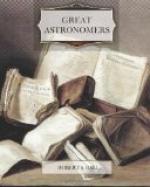John Herschel entered St. John’s College, Cambridge, when he was seventeen years of age. His university career abundantly fulfilled his father’s eager desire, that his only son should develop a capacity for the pursuit of science. After obtaining many lesser distinctions, he finally came out as Senior Wrangler in 1813. It was, indeed, a notable year in the mathematical annals of the University. Second on that list, in which Herschel’s name was first, appeared that of the illustrious Peacock, afterwards Dean of Ely, who remained throughout life one of Herschel’s most intimate friends.
Almost immediately after taking his degree, Herschel gave evidence of possessing a special aptitude for original scientific investigation. He sent to the Royal Society a mathematical paper which was published in the philosophical transactions. Doubtless the splendour that attached to the name he bore assisted him in procuring early recognition of his own great powers. Certain it is that he was made a Fellow of the Royal Society at the unprecedentedly early age of twenty-one. Even after this remarkable encouragement to adopt a scientific career as the business of his life, it does not seem that John Herschel at first contemplated devoting himself exclusively to science. He commenced to prepare for the profession of the Law by entering as a student at the Middle Temple, and reading with a practising barrister.
But a lawyer John Herschel was not destined to become. Circumstances brought him into association with some leading scientific men. He presently discovered that his inclinations tended more and more in the direction of purely scientific pursuits. Thus it came to pass that the original intention as to the calling which he should follow was gradually abandoned. Fortunately for science Herschel found its pursuit so attractive that he was led, as his father had been before him, to give up his whole life to the advancement of knowledge. Nor was it unnatural that a Senior Wrangler, who had once tasted the delights of mathematical research, should have been tempted to devote much time to this fascinating pursuit. By the time John Herschel was twenty-nine he had published so much mathematical work, and his researches were considered to possess so much merit, that the Royal Society awarded him the Copley Medal, which was the highest distinction it was capable of conferring.




